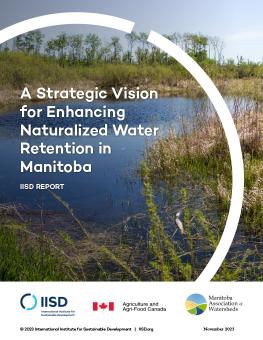
A Strategic Vision for Enhancing Naturalized Water Retention in Manitoba
In Manitoba, water retention already represents a strong option for climate adaptation and has been included in policy discussions surrounding provincial water management. Now, it's time to enhance water retention infrastructure within the province. Experts share their recommendations on how to make better decisions for the region.
With an increase in more frequent and extreme flooding and droughts, water retention infrastructure represents a strong option for climate adaptation. In Manitoba, the solution has been highlighted in the new Manitoba Initial Water Strategy Action Plan, commonly included in policy discussions around water management.
But proper water retention can provide more benefits than minimizing flood and drought risks.
Water retention can also provide numerous other benefits, especially if it is naturalized and is located, designed, and maintained strategically. In this report, we detail recommendations which can significantly influence the return on investment for water retention practices and should, therefore, be considered through long-term monitoring to help influence future implementation plans within Manitoba.
You might also be interested in
Sustainable Asset Valuation of the Nutrition Sensitive Agriculture Capacity Strengthening Project in Ethiopia
This report analyzes the social, economic, and environmental outcomes of implementing agroforestry and climate-smart agriculture in Ethiopia.
Addressing Soil Acidity and Enhancing Soil Health
This policy report addresses the critical issue of soil acidity in the East African Community (EAC) and provides actionable recommendations for EAC partner states, the EAC Secretariat, and other relevant stakeholders.
Promoting the Development of Agricultural Cooperatives
Governments in the Global South should promote agricultural cooperatives to boost smallholder access to fair markets, finance, and climate resilience.
COP 29 Outcome Moves Needle on Finance
In the last hours of negotiations, concerted pressure from the most vulnerable developing countries resulted in an improved outcome on the finance target, with a decision to set a goal of at least USD 300 billion per year by 2035 for developing countries to advance their climate action.